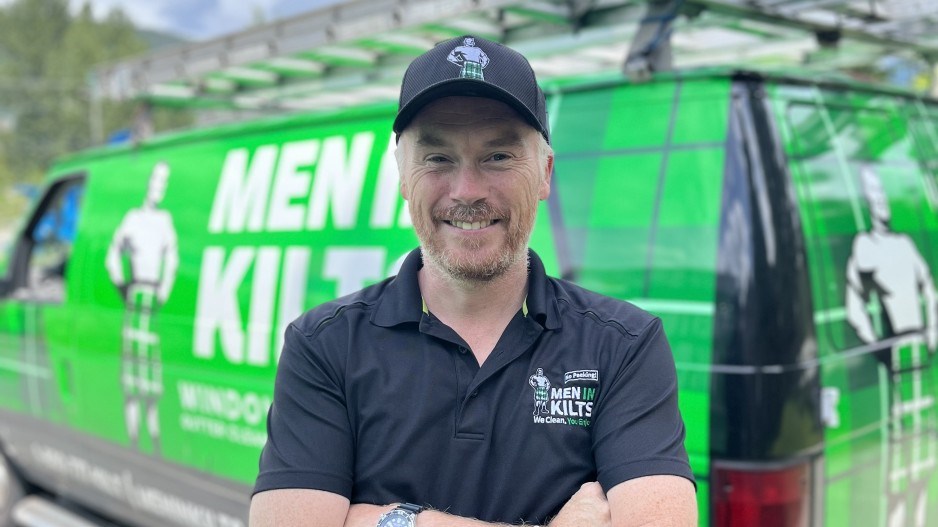The strength of entrepreneurialism in B.C. and its successful franchisees were on display earlier this year at the International Franchise Association's (IFA) annual convention in Las Vegas.
Two B.C. franchisees were the only Canadians honoured among 97 recipients of the IFA's 2023 Franchisee of the Year honours: Men in Kilts' Vancouver-based Nicholas Brand, and Fibrenew's Kelowna-based Steve and Diane Geddes.
The wins are the latest evidence that the province punches above its weight in the entrepreneurial niche that is franchising.
The franchisor parent companies nominated franchisees for the highest IFA honour for individual franchisees, based on criteria such as:
•serving home communities;
•nurturing and empowering workforces in ways that include career-growth potential for employees; and
•supporting fellow franchisees.
Brand founded the window-washing and gutter-cleaning company Men in Kilts in 2002, brought on partners, started franchising in 2010 and sold his equity stake in the franchisor in 2016.
He had long also owned Men in Kilts franchises, and now owns five franchises in regions that stretch from Horseshoe Bay to Chilliwack.
His role is largely to support four general managers, one of whom oversees two of his franchises, he told BIV. He also helps mentor other Men In Kilts franchisees and provides his knowledge from decades in the business.
Revenue at Brand's franchises have more than tripled to about $2 million since 2016, he said.
Steve Geddes has watched sales jump about 800 per cent at his Kelowna and Vernon Fibrenew franchises, he told BIV.
His company helps people refurbish car interiors, old sofas, jackets and other products made from vinyl, pleather or other materials.
"It was a one-man mobile service, and I've grown it to 12 staff and a full service location," he said.
"I'm the highest grossing franchisee at Fibrenew so they nominated me last year to be to be put forward for the IFA award."
B.C. punches above its weight in franchising
Canadian Franchise Association (CFA) data show that there are 9,865 franchises in B.C., or 15 per cent of the national total. That is above B.C.'s 13.5-per-cent share of the country's population.
Those business owners contribute about $17.5 billion to the Canadian economy, and employ about 255,000 full-time workers, according to the CFA.
B.C. has a long history of successful franchisors.
Â鶹´«Ã½Ó³»mayor Ken Sim, for example, co-founded the home-healthcare company Nurse Next Door with John DeHart in 2001, and started selling franchises in 2007. Diversified Royalty Corp. then bought Nurse Next Door intellectual property and trademarks in 2019.
Brian Scudamore is another luminary.
He started franchising his junk-removal company 1-800-GOT-JUNK? in the late 1990s, and he told BIV this morning that the company has consolidated to have about 150 franchisees.
"What has happened over the years is that our revenue continues to grow and our franchise partner base shrinks because what has been very good for us is that the more successful franchisees buy out the ones who are not as keen," he said.
Scudamore also owns the house-painting franchisor Wow 1 Day Painting, and the window-washing and gutter-cleaning franchisor Shack Shine – both of which have about 50 franchisees, he said.
"Our 1-800-GOT-JUNK? partners are doing way more in revenue and profit in a small piece of Â鶹´«Ã½Ó³»than I ever did when I owned the whole thing," Scudamore said, referring to early days in the 1990s before he started to sell franchises.
"When we air our ads, or are getting on the Oprah Winfrey Show or the Ellen Degeneres Show, more recently, these are things that help propel the brand forward, and every franchise owner benefits."
A&W Canada and Boston Pizza are some other big Vancouver-based franchisors.
Perhaps the most legendary B.C. franchisor is U. Gary Charlwood, who was inducted into the IFA hall of fame in 2008, alongside luminaries such as McDonald's Corp. (NYSE:MCD) builder Ray Kroc and Wendy's International founder Dave Thomas.
He has also received a lifetime achievement award from the CFA.
Charlwood helped pioneer one realm of franchising in Canada in the mid-1970s, when he bought Canadian rights to the U.S.-based Century 21 real estate brokerage firm. Charlwood then took the B.C. government to court to win the right to franchise real estate brokerages in the province.
"All the competition united against us and said 'This [franchising] is illegal,'" Charlwood told BIV this afternoon.
"I was a bright young star in the real estate business but the moment I started Century 21, the whole industry got together to try and ban us."
Charlwood followed up on his phenomenal success with Century 21 in 1980 by founding Uniglobe Travel International, and in 2002 by founding mortgage-brokerage franchise brand Centum. His Charlwood Pacific Group also owns Canadian franchise rights to Texas-based Real Property Management (RPM).
"Franchising is alive and flourishing in B.C.," he said. "It's the safest way to be in business for yourself but not by yourself."
B.C.'s Franchise Act sets out disclosure-document requirements and specifies what information franchisors must provide.
Scudamore, who is a past IFA Entrepreneur of the Year winner, stressed that it is various jurisdictions' disclosure documents that are key for entrepreneurs to focus on when buying a franchise.
"It really lists out the promises that you make [as a franchisor] and will keep. If it's not in the disclosure document, don't talk about it [because it is not legally enforceable,]" he warned.



